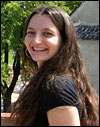
Billie Karel, Pesticide Education Project (PESTed).
What work do you do?
I am program coordinator at the Pesticide Education Project (PESTed).
What does your organization do?
We advocate for alternatives to toxic pesticides in North Carolina and empower people to make sound decisions about their health and environment. We do this through popular education, organizing in pesticide-affected communities, and watchdogging the state’s pesticide policy makers.
What are you working on at the moment?
Currently, I am basking in the glow of our organization’s most recent victory — the passage of the School Children’s Health Act by the North Carolina legislature this past summer. This new law requires public schools in our state to reduce the risk of student and staff exposure to pesticides and several other environmental contaminants. Schools must switch from conventional “spray and pray” pest control to a least-toxic alternative system called Integrated Pest Management, or IPM, both indoors and out. Schools must now also notify parents and staff annually of their pest-management program, and 72 hours in advance of any high-risk pesticide application at school if they so request. This is the first right-to-know legislation ever passed in North Carolina, and boy are we proud.
By “basking in the glow,” of course I mean I am working with parents in several counties to watchdog their local school systems and get these new rules implemented right, working with state education officials to get guidelines on the new law out to school systems, and dodging crop dusters in rural eastern areas of the state to talk with child-care providers and agency folk about using IPM in child-care centers.
How do you get to work?
I live exactly 1.2 miles from my office in Raleigh, and mostly I bike or drive, though sometimes I walk it when I’m feeling leisurely. But I travel to other parts of our state for work all the time, and for those journeys, I almost always have to drive. Sigh. I carpool when I can.
What long and winding road led you to your current position?
At the ripe old age of 26, I still feel I’m just getting started down my long and winding road. Some highlights of my relatively short history of grown-up-hood include working for a year as an English and computer teacher in Kangding, a small city in Sichuan Province, China, and interning at the Pesticide Action Network North America in San Francisco. I graduated from Stanford University in 2001, where I studied human biology, conservation, and international development, sang with a geeky-but-fun a cappella group, and traveled twice to Nepal: once to take part in a summer ecology course and again to volunteer at a Tibetan refugee camp.
Where were you born? Where do you live now?
I was born and raised in Rockland County, N.Y., and have lived in Raleigh, N.C., since 2003.
Who is your environmental hero?
What’s your environmental vice?
Travel by airplane.
How do you spend your free time?
I hang out at coffee shops on the weekend, sing with an alt-country band, and take my dog to parks for walking, frolicking, stick fetching, slobbering, and such.
Read any good books lately?
My favorite book of late was Middlesex by Jeffrey Eugenides.
What’s your favorite meal?
I perfected my eggplant parmesan recipe this summer in the height of eggplant season, and it is pretty great, if I don’t say so myself. My real favorite meal is a spicy, greasy Sichuanese eggplant dish called yu xiang chie zi, but my version of that is still far, far from perfection.
Which stereotype about environmentalists most fits you?
I’m a well-educated, idealistic, middle-class, white, long-haired woman who doesn’t wear makeup or eat meat. And that’s just for starters.
What’s your favorite place or ecosystem?
The vegetable garden at the Omega Institute in Rhinebeck, N.Y., circa 1992.
Who was your favorite musical artist when you were 18? How about now?
Sarah McLachlan then; Sharon Jones and the Dap-Kings now.
What’s your favorite movie?
Which actor would play you in the story of your life?
If you could have every InterActivist reader do one thing, what would it be?
Buy locally grown, organic food whenever you can. Join a CSA, shop at your local farmers’ market, and/or grow your own food. It’s better for your health and the health of the people who grow it, it’s better for the environment, it strengthens your community, and it promotes a more just and sustainable agricultural system. Plus, it tastes good.

